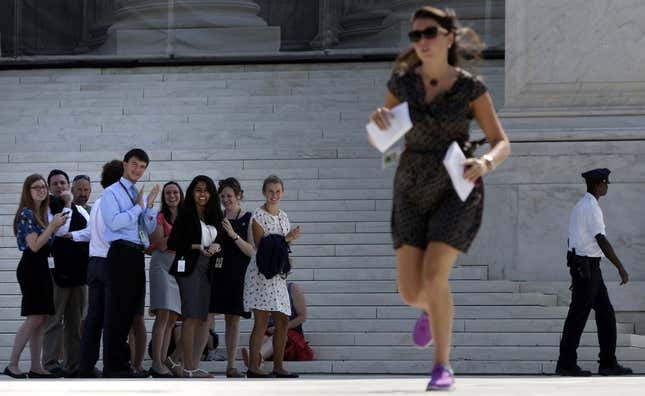
In the US, women are shortchanged by 23% compared to what men earn—and that’s when they are actually paid for their work.
As many as 77% of unpaid internships are held by women in government agencies, nonprofits and companies, according to a 2009 study by InternBridge. Among them may be one at an organization Facebook COO Sheryl Sandberg founded to promote women’s advancement, LeanIn.org.
Sandberg, author of the feminist book Lean In, wants women to climb and conquer the business world by asking for what they deserve. “I want women to get paid more. I want to teach them to negotiate so they get paid more,” she told The Guardian.
So when one of her staffers posted on Facebook that she was looking for an unpaid intern to help with editorial and social media, a mini-controversy ensued. In a Washington Post blog called “She the People“ writer Kelli Goff noted that Lean In is “a nonprofit founded by a multimillionaire” and arguing that organizations with wealthy supporters should find funds to pay their interns.
It’s true that thousands of nonprofits rely on unpaid interns to help with everything from fundraising to program development, and equally true that most of that free labor comes from women. Men are far more likely to work in paid internships at for-profit enterprises.
Why do so many women land unpaid internships? Their college major and career choice dictates a lot of that, with more women going into social justice, education and health care, said Phil Gardner, PhD, director of Michigan State University’s College Employment Research Institute. “A lot of them are working in nonprofits. That’s where the unpaid are,” he told Quartz.
There are not updated figures to the study but Gardner said the numbers may vary a bit from year to year—71% one year, 77% another—but women consistently gravitate to the unpaid internships, and men grab paid ones. (Update: InternBridge says 68% of respondents were women, but since women represent 60% of college students after first year, and tend to respond more to surveys than men, it stands by the results.)
“There’s a myth out there—all unpaid internships are evil and bad. That is not true…There are some very good unpaid internships,” he added.
After the Post published it’s piece, Lean In editor-at-large Jessica Bennett backtracked on Facebook, saying the job was not an official Lean In internship but rather a volunteer opportunity. Thus far, the volunteers have all been women.
“LeanIn.Org, like many nonprofits, has enjoyed the participation of some part-time volunteers to help us advance our education and peer support programs,” spokeswoman Andrea Saul said in a statement. Later, Lean In posted another statement on Facebook saying in the future it will start an internship program that will be paid. “We’ll continue to push for change in our own organization and our broader community.”
The news drew scathing comments on Lean In’s Facebook page from men and women alike. “Lean In is a global community committed to offering women the encouragement and support to lean in to their ambitions, as long as those ambitions don’t include paid work,” one man wrote.
A young woman posted on Facebook: “Please offer paid internships. The book is about breaking bad habits and empowering women as well, right? Isn’t financial independence part of it? Wouldn’t you be going against your principles by offering unpaid internships while the profits on the book, conferences, etc., surpass $100 million?”
Unpaid internships have come under increasing fire, especially in the corporate world, where they are usually illegal.
Facebook, however, hires hundreds of interns year-round, recruiting them from Princeton, Stanford, MIT and Georgia Tech. Far from the world of unpaid help, some of these interns earn $5,000-$7,000 a month.